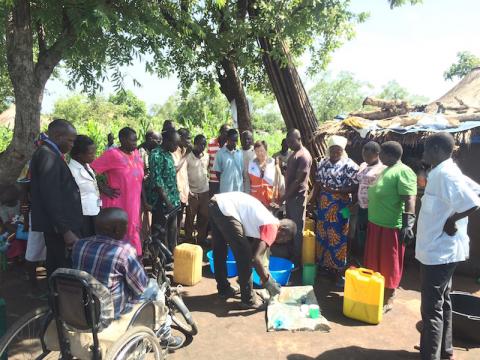Bringing back dignity and hope for refugees with disability through livelihoods

Koji Chefirina, 45, a mother of nine who fled South Sudan two years ago, was excited. She said the recent visit of Equity Bank and World Vision gave her hope of improving her family’s condition. Chefirina is part of the persons with disability (PWD) group organised and trained by World Vision on livelihood opportunities with the aim of equipping them to provide for themselves. Her feet was hit during an ambush that almost killed her son. Luckily they both survived. Immediately, she decided to seek refuge in northern Uganda and they are now staying in Maaji settlement.
Composed of 40 people, the group showed how they prepare the liquid soap that they do and sell to other refugees in the settlement. One bottle is sold at UGX1,000 (USD0.28) and they can sell at least 12-20 bottles per day. Equity Bank Credit Officer Dennis Jurna Otyang said he was impressed by the passion and enthusiasm of the group. Otyang explained the savings and financial services that the refugees can benefit from the bank to further their businesses.
Chefirina formerly owned a small shop in South Sudan selling food and other basic items that are in-demand in her village. “When we got here it was difficult that we had no income. I am so happy that World Vision gave us this chance and now has linked us up with Equity Bank. I am very grateful”, she adds. In the settlement where she lives, she has also put up a small shop selling food and household needs. She added that she learned a lot from the trainings World Vision did.
World Vision’s livelihoods program for the refugees in Maaji Settlement is part of the water, sanitation and hygiene (WASH) promotion project targeting 15,000 refugees and 3000 people from the host community. Funded by the US Government through the Bureau of Protection on Refugee Migration (BPRM), it aims to increase equitable access to clean and safe water, improve the environment and support hygiene promotion for people with disabilities, children and women.
Through the sanitation component, the group comprising of 60 members with disabilities, was trained in soap making to supply this household need in the community as well as boost their economic situation.
Apart from soap making, the group is learning how to make crutches and walking sticks that can be sold to other people with disabilities within and outside the settlement. Wani Isaac affirmed Chefirina’s words saying, “We always believe people who give you knowledge are better than those ones who give you money. We are very thankful that World Vision took care of us and trained us with new skills.”
Richard Mulandi, World Vision’s Livelihoods Advisor, said that it is an encouragement to see the refugees responding positively to the opportunities. “Our dream is for the refugees to stand on their own and for their businesses to flourish. We are happy that Equity Bank came with us expressing their support”, he says. Equity Bank has over 200 branches in DR Congo, Kenya, Rwanda and Uganda.
“The visit with Equity Bank really demonstrated what partnerships can do for the fledgling groups World Vision is training. The group now knows they are not alone and many groups are interested to support their growth and well being. If we do capacity building, we cannot just leave the groups to survive by themselves. We must walk the journey with them until they find their feet”, West Nile Refugee Response Director Judy Moore says.
Top: Cheferina with Equity Bank Officer Dennis Otyang.


